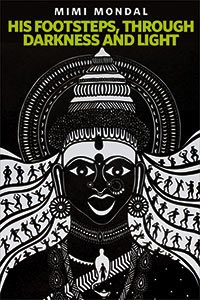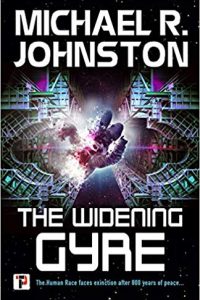Karen Burnham Reviews Short Fiction: Tor.com, Beneath Ceaseless Skies, and Clarkesworld
 Tor.com 1/23/19, 1/30/19, 1/31/19
Tor.com 1/23/19, 1/30/19, 1/31/19
Beneath Ceaseless Skies 2/14/19, 2/28/19
Clarkesworld 2/19
Tor.com continues its strong January with stories from Mimi Mondal, JY Yang, and Elizabeth Bear. Mondal’s story “His Footsteps, Through Darkness and Light” tells of a circus traveling in India. Binu is a trapeze master deeply in love with a jinni, Shehzad Marid. When they perform at a lavish wedding, a devidasi (a woman dedicated to a temple from birth) asks to run away with them, leading to consequences from the goddess she’s abandoning. Binu has to make a choice regarding the fates of the devidasi, the circus folks, and the jinni he loves. Mondal does a great job bringing the setting to life and bringing depth to Binu and Shehzad’s relationship. A circus also features in Yang’s “Circus Girl, The Hunter, and Mirror Boy“. In a version of our world where magic has only recently started to intrude, Circus Girl Lynette was once haunted by Mirror Boy, who helped her when she was a teenager and she needed to get away from the circus. Now she’s made a life for herself (“So maybe my life wasn’t perfect, maybe it was dull and not a hundred percent what I would have hoped for. But it was mine.”) and she’s not particularly happy to see him again, especially when she learns that his other hosts have been murdered. She goes to see a witch she knows who is both practical and cool. In a move that lifts this piece above the ordinary, after spending most of the story following Lynette’s POV, we get sections written from the perspectives of the Hunter and Mirror Boy, which couldn’t be more different. That really brings the weird aspect front and center as the story barrels through to its satisfying conclusion. Finally, Bear’s story “Deriving Life” is straight science fiction. In a post-flood and largely post-gender near future, Marq is dealing badly with the imminent death of their partner Tamar, and of Atticus, the sentient parasitic cancer that has improved Tamar’s life to this point and is now slowly killing him. While it’s easy to focus on the Tenants, who do their best to use their human hosts ethically, the story is fundamentally a portrait of Marq’s grief and how it affects all of their relationships. The main tension is whether Marq can even survive what they’re feeling, no matter what support the others around them try to offer. It’s undeniably intense, and I imagine many readers will veer between deeply empathising with Marq and wanting to smack them silly. That’s a level of character complexity that’s hard to achieve in a short story, especially one with a substantial amount of world building to handle as well. Bear, well experienced at this game, manages it all deftly.
Beneath Ceaseless Skies #271 brings us two stories of parentage, seen through very odd lenses. In “Blood, Bone, Seed, Spark” by Aimee Ogden, Anell Nath is a magic researcher employed by a wealthy family to chase after immortality, a respectable pursuit in which breakthroughs are constantly being made. In addition to her official research, Anell pursues a side project, collecting the issue of her lovers and crafting something very like an artificial womb. Slowly, over many years, she learns more about the fundamentals of life in her world (putting me in mind of Ted Chiang’s story “Seventy-two Letters”) as she also navigates the rather interesting society to which she’s immigrated. In the end, the story takes a dark and classic twist. Also in this issue is “Adrianna in Pomegranate” by Samantha Mills, which is partly the story of a parent crazed with grief, and partly bookbinding porn. Benedetto is a mage in a world where spells are more or less powerful depending on how they’re written: the paper, ink, font, bindings, etc., all make a difference. He’s locked up his shop as he searches for the perfect combination that will let him deal with the death of his daughter. When his ex-wife Sidony stops by (an even more powerful mage in her own right), she’s shocked by what he’s become and what he’s doing. It’s a story both lovely and harrowing, and completely obsessed with the physicality of writing.
The stories in Beneath Ceaseless Skies #272 share a watery theme. “When Sirens Sing of Roses and of Delegated Power” by Nin Harris brings us a siren who is an “independent contractor” to the Queen mermaid (their society is being slowly infiltrated by human ideas), in this case to go retrieve (steal) a particular serving dish from a particular merman wizard. He easily catches the siren, but is fascinated by her talent and her abilities; their flirtation and discussion come to an interesting and not cliché resolution. “The Boy Who Loved Drowning” by R.K. Duncan imagines a world where diviners are like pearl divers, needing physical conditioning to hold their breath long enough to dive deep and find answers, a practice shrouded in mystery and referred to as drowning. Bit is apprenticed as a very young boy to Kal, and he grows up in and around the water. It holds no fear for him and even the weeds are his friends and playmates. He has a relationship with the pool that his master cannot match, and the story naturally comes to a head. The apprentice who outstrips their master is an ancient tale, but this one is particularly well done.
Clarkesworld in February leads off with a strong science fiction/fairytale combination, “East of the Sun, West of the Stars” by Brit E.B. Hvide. An Amish-like culture sends some of its members out into the world and develops the expertise to launch a generation spaceship, the Bear, and escape a dying Earth. Faith is not one of the technical crew, instead helping to hold the community together through stories. The fairy tale called out in the title starts to feature strongly in her dreams, and her daughter Patience seems to have uncanny characteristics. When Faith starts investigating, she learns some interesting truths and has to decide what to do with them. I liked Faith’s character and also the way the religious community was treated respectfully, not caricatured. “Give the Family My Love” by A.T. Greenblatt is an amazing balancing act between concerns both enormous and deeply personal. Hazel is an asthmatic anthropologist, chosen to approach an interstellar Library complex after a group of traveling Librarians makes contact with Earth. The story is told entirely through her letters to her brother Saul, starting as she has to walk a treacherous kilometer by herself in order to gain access to the edifice. Inside she hopes to find lost research that can directly address some of humanity’s biggest problems on a dying planet, including her brother and sister-in-law’s infertility. Hazel’s voice as she dictates the letters is great, both funny and human, and the motivations driving her choices unfold organically.
Two stories deal directly with colonial concerns and both left me slightly uneasy. “The Final Ascent” by Ian Creasy features Lucian, a dying mountaineer who made a career exploring exoplanets. His xenoanthropologist ex-girlfriend Kath brings him an opportunity to join in the alien afterlife on this particular planet, living an incorporeal life but interacting with these aliens, depicted as very low-tech, both living and dead. The story focuses on his experience of the afterlife and how he starts interacting with the group of living aliens who are providing Kath with the means to translate humans into the afterlife. Lucian introduces many things to this group, conflicts ensue, and in the end he and Kath are left to wonder at what will unfold as the result of their meddling. Given Lucian’s ethereal status, he doesn’t face many consequences no matter which way things go – he literally doesn’t have a lot of skin in the game. Then in “The Butcher of New Tasmania” by Suo Hefu (translated by Andy Dudak), a person is writing from prison to give their perspective on an unsettling series of events. They were part of an interstellar expedition that was exploring a planet and hoping to find it uninhabited – instead they met some locals and end up massacred; our narrator is the sole survivor. They return to the ship, but keep observing the planet and realize that it is riven by constant racial warfare. Their answer to this situation is to engineer a genetic manipulation and release it on the planet such that it non-violently wipes out one of the racial groups (imagine if white people and black people could all have children, but no matter who the parents are, only white children will be born). I notice this method of genocide was also featured (aimed at humanity) in a story by Lawrence M. Schoen discussed in last month’s column. The narrator asks people to see the situation from their point of view, with their justifications. I know which side I come down on when it comes to judgment; I wonder how much readers will be split on it.
Recommended Stories
“The Boy Who Loved Drowning”, R.K. Duncan (Beneath Ceaseless Skies #272)
“Give the Family My Love”, A.T. Greenblatt (Clarkesworld 2/19)
“His Footsteps, Through Darkness and Light”, Mimi Mondal (Tor.com 1/23/19)
“Bone, Blood, Seed, Spark”, Aimee Ogden (Beneath Ceaseless Skies #271)
Karen Burnham is an electromagnetics engineer by way of vocation, and a book reviewer/critic by way of avocation. She has worked on NASA projects including the Dream Chaser spacecraft and currently works in the automotive industry in Michigan. She has reviewed for venues such as Locus Magazine, NYRSF, Strange Horizons, SFSignal.com, and Cascadia Subduction Zone. She has produced podcasts for Locusmag.com and SFSignal.com, especially SF Crossing the Gulf with Karen Lord. Her book on Greg Egan came out from University of Illinois Press in 2014, and she has twice been nominated in the Best Non Fiction category of the British SF Awards.
This review and more like it in the April 2019 issue of Locus.
 While you are here, please take a moment to support Locus with a one-time or recurring donation. We rely on reader donations to keep the magazine and site going, and would like to keep the site paywall free, but WE NEED YOUR FINANCIAL SUPPORT to continue quality coverage of the science fiction and fantasy field.
While you are here, please take a moment to support Locus with a one-time or recurring donation. We rely on reader donations to keep the magazine and site going, and would like to keep the site paywall free, but WE NEED YOUR FINANCIAL SUPPORT to continue quality coverage of the science fiction and fantasy field.






